•••••••••••••
Fascism in America: The Essential Mae Brussell
edited by Alex Constantine
Contents:
Introduction: The Mind of Mae Brussell, by Paul Krassner
Chapter One: Defense Industry And Nazis Linked To JFK Assassin – Mae Brussell Profile, San Francisco Chronicle, January 7, 1981
Chapter Two: Fascism in America - Mae Brussell Interview, KLRB-FM, Carmel, California, 1971
Chapter Three: The Nazi Connection to the John F. Kennedy Assassination
Chapter Four: Timeline – How the Past Affects our Future and the Present
Chapter Five: How Nixon Rose to Power
Chapter Six: Why Is the Senate Watergate Committee
Functioning As Part of the Cover-Up?
Chapter Seven: Thirty Watergate Witnesses Have Met Violent Deaths
Chapter Eight: Letter to President Richard M. Nixon
Chapter Nine: The Evil Feedback Loop & Emerson's Law of Conservation – 1978 Conspiracy Digest Interview
Chapter Ten: Why Was Patricia Hearst Kidnapped?
Chapter Eleven: OPERATION CHAOS – From Monterey Pop to Altamont: the CIA's War Against the Sixties Counter-Culture
Chapter Twelve: The Assassination of John Ono Lennon (Interview)
Chapter Thirteen: About Women ... – Playgirl Interview, 1974
Chapter Fourteen: World Watchers Program Outline, October 4, 1982
Chapter Fifteen: The Murder of John Belushi
Chapter Sixteen: Who Killed Congressman Larry McDonald? – Ronald Reagan, the Western Goals Foundation and the Downing of KAL Flight 007
Chapter Seventeen: NASA'S CHALLENGER, R.I.P., January 28, 1986
Chapter Eighteen: Mae Brussell on the Air – Miscellaneous Radio Transcripts
Chapter Nineteen: CIA-Mafia conspirators can rest easier – Mae Brussell Obituary
And I may even sweeten the pot with a few surprises.
- AC
PS: COMING SOON: Psychic Dictatorship in the USA II, by Alex Constantine.
••••••••••••••
The John Belushi chapter from Fascism in America:
 Mae Brussell – World Watchers International radio broadcast, March 21, 1982. Transcribed and edited by Alex Constantine
Mae Brussell – World Watchers International radio broadcast, March 21, 1982. Transcribed and edited by Alex Constantine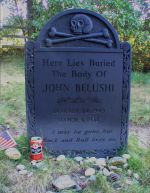 When John Belushi died, there was much confusion in Los Angeles for the first week or so from the coroner's office and police officials concerning the cause of death. A week later, the headlines delivered a fait accompli – that he was always drunk, a slob, took drugs all the time. He had this expensive drug habit.
When John Belushi died, there was much confusion in Los Angeles for the first week or so from the coroner's office and police officials concerning the cause of death. A week later, the headlines delivered a fait accompli – that he was always drunk, a slob, took drugs all the time. He had this expensive drug habit.I didn't know John Belushi, but he was very successful, just as many rock musicians died at the peak of their success, at the crest when they were about to do better things. This death follows the same pattern.
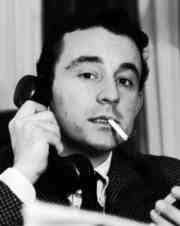 Louis Malle
Louis MalleHe was about to make, with partners, two very important and highly political movies. One was to be called Blue Moon Over Miami, and it was to be directed by Louis Malle, the fellow who directed Atlantic City, nominated for an Academy Award – and also My Dinner with André; it's been suggested this was the best picture of the year. Malle is a serious director. The script was written by highly-successful and well-known writer, John Guare.
So one of the movies that Belushi was about to make was a comedy about the FBI and drug smuggling from Colombia to Miami. And he would play the role of the drug dealer, an informer for the FBI, and then the FBI agent becomes the drug dealer. That is, you must admit, a very controversial movie because the state of Florida depends upon the drug market. It is probably the biggest going industry in Florida, and also the United States.
And these people don't appreciate comedy.
And the network of assassination teams and drug dealers selling poison drugs comes from headquarters in Hollywood and Miami.
Belushi was also in Hollywood to make a movie called Noble Rot, and he was to be with his good friend Don Novello, Father Sarducci. Now, Father Sarducci and John Belushi were making a movie about the wineries in California, dominated by the mob. They are trying to establish social acceptance, and this was to be a comedy about the Italian Mafia. Noble Rot, you can imagine what that is by the title alone.
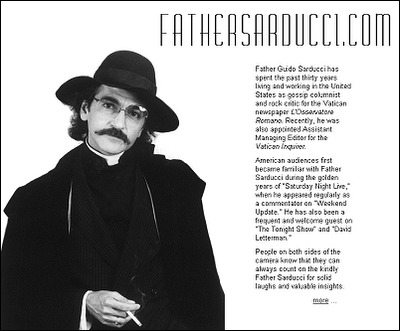 So if you think that Belushi was not overly-political, forget it. In the past, he made fun of the Establishment. And to make fun of the Establishment is lethal.
So if you think that Belushi was not overly-political, forget it. In the past, he made fun of the Establishment. And to make fun of the Establishment is lethal.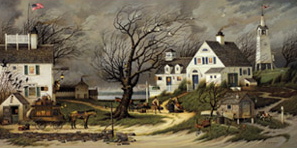 Incidentally, Belushi had bought a $400,000 home up at Martha's Vineyard – he had 2,000 feet of ocean-front land and eight-and-a-half acres. He bought it in 1979 from former Defense Secretary Robert McNamara. When you read that a man had $2-million in life insurance, and has a $400,000 home that belonged to Robert McNamara, he wasn't just drugging and goofing off, his lazy, sloppy, sleazy image. After he was dead, the articles came out, the mess he lived in, the dirt. To get into productions, you have a commitment to be on time. Millions of dollars are invested in you. You have a schedule you keep, and while it looks like fun and games on the screen, and I'm sure there is plenty of goofing off, there were also a lot of brilliant laughs – and plans and commitments to schedules and sense of timing. The image given after he was dead was the big slob who almost deserved to die in his own vomit. But that wasn't John Belushi. His success, what he earned and what he was saying speak loud and clear. All the rest is garbage. You don't have to believe the cover stories once the fellow is dead.
Incidentally, Belushi had bought a $400,000 home up at Martha's Vineyard – he had 2,000 feet of ocean-front land and eight-and-a-half acres. He bought it in 1979 from former Defense Secretary Robert McNamara. When you read that a man had $2-million in life insurance, and has a $400,000 home that belonged to Robert McNamara, he wasn't just drugging and goofing off, his lazy, sloppy, sleazy image. After he was dead, the articles came out, the mess he lived in, the dirt. To get into productions, you have a commitment to be on time. Millions of dollars are invested in you. You have a schedule you keep, and while it looks like fun and games on the screen, and I'm sure there is plenty of goofing off, there were also a lot of brilliant laughs – and plans and commitments to schedules and sense of timing. The image given after he was dead was the big slob who almost deserved to die in his own vomit. But that wasn't John Belushi. His success, what he earned and what he was saying speak loud and clear. All the rest is garbage. You don't have to believe the cover stories once the fellow is dead. 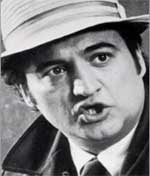 Three nights before he died he was on LaCienega Blvd. near Wilshire., just bordering Beverly Hills. He was with a cab driver who gave an interview. It was late at night. They were sitting at a counter at a sandwich shop, and there was a newspaper there. They both were looking at it, and he asked Belushi, "Which part do you want, 'Sports,' 'Entertainment," or 'El Salvador'" And Belushi said: "I want El Salvador." He went on to say that he hated what he read in the news, that he hated Hollywood, that they're a "bunch of pricks. I want to get back to New York City." And he said that he wanted to stay there.
Three nights before he died he was on LaCienega Blvd. near Wilshire., just bordering Beverly Hills. He was with a cab driver who gave an interview. It was late at night. They were sitting at a counter at a sandwich shop, and there was a newspaper there. They both were looking at it, and he asked Belushi, "Which part do you want, 'Sports,' 'Entertainment," or 'El Salvador'" And Belushi said: "I want El Salvador." He went on to say that he hated what he read in the news, that he hated Hollywood, that they're a "bunch of pricks. I want to get back to New York City." And he said that he wanted to stay there.They went to Belushi's car, where he had a lot of cocaine in the glove compartment. But the driver said Belushi was unhappy, fearful of his environment, that he wanted to get back [to New York]. I think that about describes it. There was another article published about him, that he didn't want to stay in Hollywood. The last night before he died, Belushi said to somebody, "I'm going home to Judy tomorrow" – that's his wife in New York – "I want to get out of here."
I'm sure that he sensed some danger, just as Elvis Presley was poisoned until he died. Or John Lennon was kept secluded and isolated in an apartment, and the minute he emerged, he died.
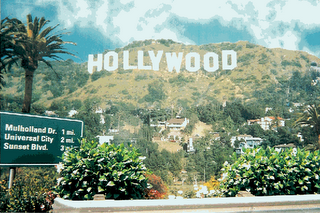
Belushi, when he was in Hollywood, was bounced around the drug scenes and a lot of hard people, a very sleazy element that could entrap him later. He expressed the idea that he would leave the next day, evidently drop the movie and go back to New York. But that next day never came.
He'd hired bodyguards. The studios wanted to keep him from using cocaine. If he did indeed have it, they wanted to keep him clean.
Well, Nelson Rockefeller, vice president of the United States, had bodyguards who weren't around when he died. Robert Kennedy had a bodyguard, Thane Cesar from Lockheed, who was behind him when the fatal bullets were delivered to the back of his head. Bodyguards often let people through the door who shouldn't be there. It's a question of the agencies that employ them.
Who was looking after Belushi? Two nights before, someone came to his home - Evelyn Smith – the same woman who would be with him when he died. She was kicked out.
She reappears ... and she's one of the major suppliers of drugs to the Hollywood stars. Her behavior at the death scene was questionable – not only was supplying narcotics a crime, but not calling 9/11 or the police or the hotel desk is irresponsible; she was there when he died, went away for a couple of hours, returned. Smith didn't call anyone. She let the bodyguard, who appeared at 12:30 p.m., find the body, even though Belushi was dead when she walked out.
So, again, who were the security guards?
Another article in the paper: "John Belushi Felt Tragically Alone." He was paranoid that he was being used. It's probable that ever since he appeared on Saturday Night Live and did impersonations of famous people, he was placed on an enemies list. He was that political. The last performance of Saturday Night's original group was [so radical], a friend asked me how they got away with it. The next day, the whole group was fired, and it was reported that they were "too political." The whole group was broken up.
Sure, he was followed and used by people. I'm sure that he was prepared by this milieu around him to be done in if he continued to be political. And the two movies that he was going to make were so highly political that it would be imperative to see that he didn't gather any further fame and notoriety.
Noble Rot means the "noble" priest, Sarducci, and the rottenness of the winery people. You can imagine how popular he was with the wine people behind the Hollywood studios and the drug scene.
And, again, the movie Blue Moon Over Miami. I must repeat, these are not popular subjects to make movies about.
 The papers reported that John Belushi died alone in bed, nude, in a fetal position. Lieutenant Dan Cook of the LAPD said, "it appears to be natural causes. There were dark blotches on his arms caused when blood starts to settle, and not by needles." That was the first report. Then the police said it appeared he choked on his tongue.
The papers reported that John Belushi died alone in bed, nude, in a fetal position. Lieutenant Dan Cook of the LAPD said, "it appears to be natural causes. There were dark blotches on his arms caused when blood starts to settle, and not by needles." That was the first report. Then the police said it appeared he choked on his tongue. John Belushi died on Friday. On Saturday there were more articles about food, choking, natural causes. Heart attack was a possibility. No sign of drug usage. The hotel clerk said his heart evidently failed him. The room was neat, the actor in bed, his clothes neatly folded as though he had gone to sleep for the night. There was nothing out of order, "no reason to suspect foul play."
He was in good health the night before, according to witnesses.
By Sunday, Los Angeles coroner Thomas Naguchi - the controversial Naguchi who was fired after this case – was telling reporters, "the cause of death has not yet been determined."
"Discounting his lifestyle, he seems to have choked on food." – that was the San Francisco Examiner (March 7). He was at the Roxy nightclub the night before he died, and the owner of the club said that he hadn't taken any drugs.
On Monday, the newspapers reported: "More Tests Needed to Determine Cause of Death."
The Houston Post reported that Belushi was under examination, they were inspecting his heart.
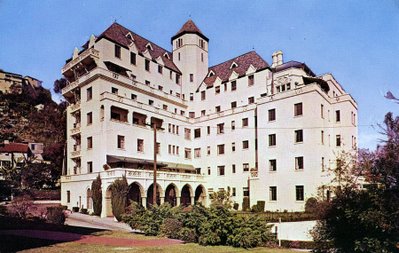 The Chateau Marmont
The Chateau MarmontThey said he ordered breakfast: "whole wheat toast, jelly, a pot of coffee and freshly squeezed orange juice." He had breakfast on the terrace. Now, Evelyn Smith ordered the breakfast, and at 10:30, when Belushi was nice and dead, she went out for breakfast, she said. But it's obvious that from 6:30 to 8:00, when it was ordered, he was not in any condition to eat.
On Monday the cause of death was still undetermined. Slides of tissue had to be taken, more pathology of the body. Dr. John Holloway – a doctor who worked on the autopsy of Senator Robert Kennedy – entered the case and insisted that parts of the body would have to be removed and internal organs examined to determine if the cause of death was a heart attack.
 Now, if Belushi overdosed on narcotics, and there was a mess of needles, cocaine and heroin littering the place as reported 10 days later – the first five days it was reported that there were "no drugs" involved – then the search for a heart attack was superfluous. The doctor from the Robert Kennedy autopsy said that the evidence "may not be so visible," so the tissue "must be tested, and full anatomic evidence presented."
Now, if Belushi overdosed on narcotics, and there was a mess of needles, cocaine and heroin littering the place as reported 10 days later – the first five days it was reported that there were "no drugs" involved – then the search for a heart attack was superfluous. The doctor from the Robert Kennedy autopsy said that the evidence "may not be so visible," so the tissue "must be tested, and full anatomic evidence presented.""It may be myocardial infarction, or a coronary attack," Dr. Holloway said.
So they weren't so sure.
Tuesday: No comment on Belushi, a second round of tests for toxic substances and evidence of disease on samples of tissue taken.
On the sixth day, March 10, they still didn't know what killed him. There were interviews. The police said there was a powder resembling cocaine on the nightstand, his body had needle marks likely to be from intravenous injection of cocaine.
 Seven days after his death, it was an "overdose of drugs." Chief of Police Gates in Los Angeles said he didn't know about an overdose; he had been informed that the musician-actor died of "natural causes." On this day, "Signs of Drug Usage on Belushi's Body" were reported. He had been stuck with "a needle." One report stated that there were numerous needle marks, another reported only one – and yet another said the dark spots were from blood clots.
Seven days after his death, it was an "overdose of drugs." Chief of Police Gates in Los Angeles said he didn't know about an overdose; he had been informed that the musician-actor died of "natural causes." On this day, "Signs of Drug Usage on Belushi's Body" were reported. He had been stuck with "a needle." One report stated that there were numerous needle marks, another reported only one – and yet another said the dark spots were from blood clots. And then the official autopsy report came out – and that was the shocker, because it contained very little information related to questions that should have been asked.
The L.A. Examiner: "Official Report on Belushi Death" – "At 1:00 am, he went to a private bar. He stayed there and was driven back to his room, where he vomited, and was pale and sweaty."
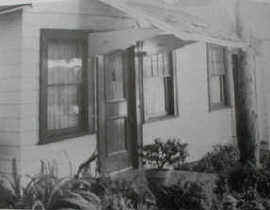 Bungalow Three at the Chateau Marmont
Bungalow Three at the Chateau Marmont He was immediately sick – and then indulged in wine and cocaine. There was no evidence of sickness when the police first entered the room. They thought he had a heart attack.
At 3:00 till 3:30 am, friends arrived, people came, according to the report. We don't know how many, and they are not named. We don't know how many there were. They arrived at the hotel and stayed about 30 minutes.
That would be the time when he was injected with the "cocaine or heroin."
By 6:30, he was having hot and cold flashes, took a shower.
At 8:00 a.m., he fell asleep shaking and wheezing. Evelyn Smith entered the hotel room, and at 9:30 she heard him struggling for breath.
He was terrified and very sick.
She hears a terrible noise, and he pleads: "please don't leave me."
At 10:15, he falls asleep, so she walks out, leaves him "to get something to eat."
He knew that he was dying, but she walks out.
At 12:30, Belushi's physical therapist come in, the body was still warm. He was pronounced dead.
Belushi had "congestion of the lungs, liver and spleen, swelling of the brain and heart, arteriosclerosis, distended bladder," and they threw in "obesity"; he weighed 220 pounds. All of this should have showed up in the first autopsy. It doesn't take 7-10 days to find all of this, and the enlarged brain (the weight was given in the autopsy report) would have been tremendously painful.
He was writhing in pain. When Ms. Smith left the hotel room, he was covered with a blanket and there was foam coming out of his mouth. He swallowed his tongue. And the eyes rolling – in fact, a friend who entered the room said, "I closed his eyes, because I couldn't stand to see them open."
So she would have seen easily that he was dying, the terrible set of symptoms. And she walks out and leaves. Then she comes back, the police hand-cuffed and took her away. Then they released her, and she becomes a super-star, goes to New York City for an interview at ABC, does an article for Rolling Stone.
 Cathy Evelyn Smith was not charged with any role in Belushi's death. There was no mention of collusion, but the unidentified guests who arrived at 3:00-3:30 were a clue that something was amiss.
Cathy Evelyn Smith was not charged with any role in Belushi's death. There was no mention of collusion, but the unidentified guests who arrived at 3:00-3:30 were a clue that something was amiss. The first reports that he was taking drugs – the police chief and coroner didn't mention it – came from the ABC network. A lawyer for ABC is Gregson E. Bautzer, one of the attorneys retained by Howard Hughes (at the time that HE was drugged, silenced and possibly murdered. Greg Bautzer is the law partner of Frank Rothman at MGM, the domain of Kirk Kerkorian and Fred Benninger, chairman of MGM Mirage.)
ABC had "inside information" and worked closely with teams involved in other mysterious, drug-related deaths. The coroner came along after the ABC reports and stated that Belushi overdosed by "intravenous injections of heroin and cocaine." The report stated that Cathy Evelyn Smith was with him when he died.
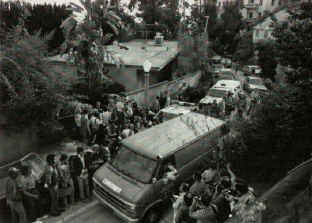 The coroner's van at the back gate, Marmont Lane
The coroner's van at the back gate, Marmont LaneIs she responsible for his death if she sees him writhing in pain, obviously dying, foaming at the mouth, choking? She didn't call 9/11, didn't run to the front desk.
The article in the Los Angeles Herald-Examiner reported: "Belushi may have died before the woman left him."
Where does murder begin and leave off?
What was her responsibility?
Who were the people in the room?
This was a very political, highly successful person offed in Hollywood. Smith left him to die. There were fresh multiple injection marks on both arms. There was no evidence of scarred veins in either arm. He'd been only recently injected. The body was still warm.
She ordered breakfast at 8:00, went out for breakfast again at 10:30. He turns up dead. She doesn't call anyone, lets him be found.
Tom Gerald flies her to the Essex Hotel in New York City with her attorney, and puts her on ABC-TV's 20/20. The "Mystery Woman" is described as a known "drug dealer" in Hollywood, supplies big celebrities with narcotics. When they die, shouldn't she be
questioned?
John Belushi didn't trust her. His bodyguard kicked her out two nights before he died.
"I don't believe the story," Belushi's wife said.
The night after he kicked Smith out, Belushi told friends he wanted to get out of town because he didn't feel safe.
He felt he was in danger.
She suddenly appeared at the "unnamed club" above Roxy's in the autopsy report. Belushi is visited by unnamed people. There are anonymous sources of drugs. The LAPD only made a cursory search for the source and announced that no charges would be filed.
An unnamed rock star was with him shortly before he died – not mentioned in the autopsy report – and said: "there wasn't a needle present anywhere."
His doctor said there were no needle marks on him prior to the fatal injection. (Belushi had recently been to the doctor for treatment of ear, nose and throat problems.)
There were no "multiple" needle punctures, no scarring of the veins, no proof that he had been a junkie. He may have taken cocaine and marijuana – they are all over Hollywood – but certain segments of society are dying.
His wife said immediately, in article printed by the Chicago Sun-Times: "Something weird happened. That woman was thrown out two days ago. John told Bill to throw her out. John wasn't a junkie."
Evelyn Smith was with Gordon Lightfoot for a short while in Toronto. She moved to L.A. in 1978 for the drug scene. And Judith Jaqueline Belushi wanted to know "where she came from, who is this woman, what was she doing there, and how does she appear the night that she dies?"
Smith was with Belushi until he was dead – and, of course, the obvious move was to not call the police. (When Nelson Rockefeller died, Megan Marshack, his staff assistant, was present and didn't call the guard or chauffeur outside the door, or 9/11 or the hospital – she called Poncitta Pierce, who lives down the street, and she comes over, and the two of them talk it over and decide to call police ... when he's good and dead.)
The newspapers reported later that police were searching for the source of the drugs – how far did they have to go. All they had to do was ask the "Mystery Woman."
He begged her not to leave. She left Belushi ... who was supposedly so heavily into drugs that they there all over the place.
But the police didn't find drugs and powder and needle marks at that time.
She reappeared two hours later and brought the drugs with her – then she could spread the cover story that she took them with her when she left. And she did confess, "I didn't want to leave [a drug stash behind] because the maid might find it."
If a woman is a drug dealer, and the police are coming because a man is dead, the last thing she would do is incriminate herself by walking in with a stash of cocaine and drug paraphenalia.
Why did she bring it all back and lay it in front of them – unless she knew that she wouldn't be held for the murder? Was she so mindless (after fearing the maid might find the drugs) that she returned to the death scene with cocaine on her for police to
confiscate?
 Then the stories came along: "John Belushi's Reckless Race to the Grave," the "drug-soaked sex orgies," a one-way ticket to Hell. But it would be awfully hard, as I say, to make a multi-million dollar movie with a "$25,000 a month cocaine habit," or work with the finest directors and writers going in Hollywood. I am sure that he was not the crazy, reckless pig that he was made out to be after he was dead.
Then the stories came along: "John Belushi's Reckless Race to the Grave," the "drug-soaked sex orgies," a one-way ticket to Hell. But it would be awfully hard, as I say, to make a multi-million dollar movie with a "$25,000 a month cocaine habit," or work with the finest directors and writers going in Hollywood. I am sure that he was not the crazy, reckless pig that he was made out to be after he was dead.  Kate Braverman
Kate BravermanThe worst article came from Kate Braverman, staff reporter at the Los Angeles Times: "A harsh final look at Belushi, the patron saint of pigs." So he "hits Los Angeles and goes berserk... What else in Los Angeles good for? It's the last frontier for desperate men, rock stars, exiled tyrants. Los Angeles is a Disneyland for the decadent, a top ticket all the way, the best ride to Hell." Belushi was "the belly of this century," with "an endless appetite for novelty and the rot that began with manifest destiny." She tears him apart, a twentieth-century "nightmare."
"Much Ado About Nothing," opined the San Francisco Chronicle. "Saturday Night Live was designed to attract the sleepy and the sloppy." John Belushi will be "totally forgotten in a few years."
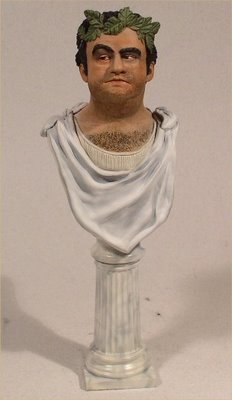 But he will be remembered for the programs he did with Lampoon and Saturday Night Live. His particular brand of political humor was genius – and that was his fatal mistake.
But he will be remembered for the programs he did with Lampoon and Saturday Night Live. His particular brand of political humor was genius – and that was his fatal mistake.
















1 comment:
Man, I always had such a hard time with the idea that Belushi self destructed. This rings like a bell, calling me to more discernment in the poison fog of media. Thanks for an amazing collection of articles
Post a Comment